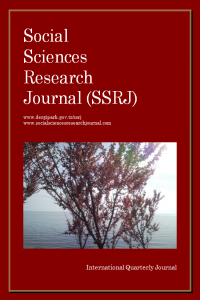Neoliberal Politikaların Türkiye’deki Yansıması: Yoksulluk
Ülkelerin gelişmişlik düzeyi ile de doğrudan ilgili olan yoksulluk, çok yönlü ve karmaşık bir yapıya sahiptir. Gelir ve refah kaybı yanında, eğitim, iş bulma, barınma ve sağlık hizmetlerine ulaşmada yaşanan yetersizlikler ya da bu olanaklara erişim zorlukları gibi sıkıntılar şeklinde de ortaya çıkan yoksulluk değer yargılarına göre farklı toplumlarda, farklı şekilde algılanabilmektedir. Bu yönüyle subjektif nitelik taşıyan yoksulluk kavramı, standartlar belirlenerek, ölçülmeye çalışılmaktadır. Top yekûn toplumların refahını ilgilendiren yoksulluk ve yoksullukla mücadele bu bakış açıları ve taşıdığı sosyo-ekonomik boyut nedeni ile kalkınma iktisadının önemli bir alanını oluşturmaktadır. Ekonomik kalkınmada esas olan reel sektörde istikrarlı bir gelişme ve sağlıklı bir kurumsal yapıya sahip olabilmek için, yoksulluk gibi sosyal ve ekonomik boyutlu sorunların öncelikle giderilmesi gerekmektedir. Kısaca asgari yasam standardının altında olma hali olarak tanımlanan yoksulluk, bireylerin refah ve mutluluk kayıpları anlamını taşımakla beraber, tarih boyunca tüm toplumların önemli sorunlarından biri olmuştur. Dünyada 1980’lerle birlikte, yoksulluğa da çare olacağı vaat edilen neo liberal politika uygulamaları ağırlık kazanmıştır. Ancak 21.yüzyıla gelindiğinde artan üretim ve gelir seviyesine rağmen, yoksulluk sorununun hala önemli boyutlarda oluşu neo liberal uygulamalara yönelik eleştirileri yoğunlaştırmaktadır. Uluslararası Para Fonu(IMF), Dünya Bankası(DB), Dünya Ticaret Örgütü(DTÖ) gibi kuruluşların da katkıları ile uygulanan bu politikalar, sanayi toplumundan bilgi toplumuna geçişte hızlı gelişmelere sahne olmanın yanında, gelir dağılımında bozulma, işsizliğin ve yoksulluğun artması gibi sorunlara da neden olmuştur. Bu çalışma ile, Türkiye’de 1980 yılı sonrası uygulanan neo liberal politikaların ekonomik ve toplumsal etkilerini ortaya koyarak, bu politikaların sürdürülebilirliğini tartışmak amaçlanmıştır.
Anahtar Kelimeler:
Neo liberal politikalar, yoksulluk, kalkınma.
The Reflection of Neoliberal Politics in Turkey: Poverty
The poverty, which is in direct relation with the development level of the countries has a multidimensional and complicated structure. The poverty, which also appears alongside of income and property loss, the incompetency to access to education, job getting, sheltering and health services or difficulties to reach these possibilities can be detected in different societies in different ways according their value judgement. With this point of view the poverty conception having subjective nature is tried to be measured by fixing the standards. The poverty, which is in interest for the property of the societies in total and fight against the poverty is composing an important area of the developing economy due to these point of views and carrying social-economic dimension. In order to have a stabile development and healthy corporate structure, which is the basis in real sector in economic development, it is necessary to remove the problems of social and economic dimensions as poverty primarily. Briefly the poverty, which is described as to be under the minimum living standards has been one of the important problems of the societies during the whole history, has also the meaning the lost of poverty and happiness of the individuals. The neo liberal politic applications, promised also as a solution of poverty, became important in 80ies. However being in 21st century and the problem of poverty is still in important dimensions the critics are intensified orienting to neo liberal applications These politics, which are applied by the contribution of the institutions such as the International Money Fund (IMF), World Bank (WB), World Trade Organisation (WTO) have been the reason of the problems such as of deformation of income distribution, increase of non-employment and poverty but presents the speedy development from industrial society to information society. With this work it is aimed to negotiate the sustainability of these politics by expressing the economic and social effects of the neo liberal politics after 1980 in Turkey.
Keywords:
Neo liberal politics, poverty, development,
___
- Adelman, I. ve Yeldan E. (2000). The End of the Developmental State? Structural Change and Economic Dynamics, September . Güzelsarı, S. (2008). Küresel Kapitalizm ve Devletin Dönüşümü, İstanbul:Sosyal Araştırmalar Vakfı, Ezgi Matbaacılık.
- Harvey, D. (2005). A Brief History of Neoliberalism, New York: Oxford University Pres.
- Hıggs, R.(1994). Nineteen Neglected Consequences of Noncome Redistribution, The Freeman. December (Çev: Ertek N, S.) “Gelirin Yeniden Dağılımının 19 Nedeni”.
- ILO(2005). World Employment Report 2004-05, Geneva. İnsel, A. (2004). Neo-Liberalizm: Hegemonyanın Yeni Dili., İstanbul:Birikim Yayınları.
- Kabeer, N. ve Humphrey J. (1991). Neoliberalism, Gender and the Limits of the Market States or Markets? Neoliberalism and the Development Policy Debate, Clarendon Press, Oxford, s.17- 30. Kaynak M.(2005). Kalkınma İktisadı, Ankara :Gazi Kitabevi.
- Kazgan, G. (1984). İktisadi Düşünce veya Politik İktisadın Evrimi. İstanbul: Remzi Kitabevi.
- Kazgan, G.(2008).Türkiye Ekonomisinde Krizler (1929-2001): Ekonomi Politik Açısından Bir İrdeleme, , 2. Baskı, İstanbul:İstanbul Bilgi Üniversitesi Yayınları.
- Mcıntosh, A. And Vaughan, A. (1996). Enhancing Rural Livelihoods in South Africa: Myths and Realities. Maliye Bakanlığı, Yıllık Ekonomik Rapor, 2013.
- Phılıpp, B.(1999). Poverty Reduction Projectpoverty –World Bank And Undp Concepts, Deutsche Gesellschaft Für Technische Zusammenarbeit (Gtz) Gmbh, Pp.1-8.
- Saad-Fılho, A. (2007). Washington Uzlaşmasından Washington Sonrası Uzlaşmasına: İktisadi Kalkınmaya Dair Neoliberal Gündemler. (çev: Ş. Başlı ve T. Önel). Saad-Filho, A. ve Johnston, D. (eds.). Neoliberalizm: Muhalif Bir Seçki. (ss.191-201) İçinde. İstanbul: Yordam Kitap.
- Steger, M. B. (2004). Küreselleşme, Çev: Abdullah Ersoy, Ankara:Dost Yayınları. Todaro, M. P., (2000). Economic Development, Seventh Edition, Addison Wesley, Massachusetts,pp.151-152.
- TUİK(2012). Hanehalkı İşgücü Araştırması, 2004-2012, www.tuik.gov.tr
- TUİK(2010),Türkiye İstatistik Kurumu Gelir ve Yaşam Koşulları Araştırması 2010, www.tuik.gov.tr
- TÜİK(2012). Gelir ve Yaşam Koşulları Araştırması, www.tuik.gov.tr
- UNDP(2011). Human Development Report 2010, http://hdr.undp.org/en/ Wade, R.H. (2003). What Strategies Are Viable for Developing Countries Today? The World Trade Organization and the Shrinking of 'Development Space, Review of International Political Economy 10 (4), 621-44.
- Wallerstein,I.(1994). Development: Lodestar or Illusion?, , Capitalism and Development, Routledge, London, Pp.20-33.
- Williamson J.(2000). “What Should the World BankThink About The Washington Consensus?”, The World Bank Research Observer, Vol.15, No.2, August 2000, pp.2.
- World Bank, World Development Report(1990). World Bank, World Development Report (1997): State, Oxford University Press, s. 27. Yeldan E.(2000). Neoliberal Küreselleşme İdeolojisinin Kalkınma Söylemi Üzerine Değerlendirmeler, Praksis Dergisi. http://www.turkis.org.tr erişim:09.02.2014
- Yayın Aralığı: Yılda 4 Sayı
- Yayıncı: Denta Florya ADSM Limited Company
